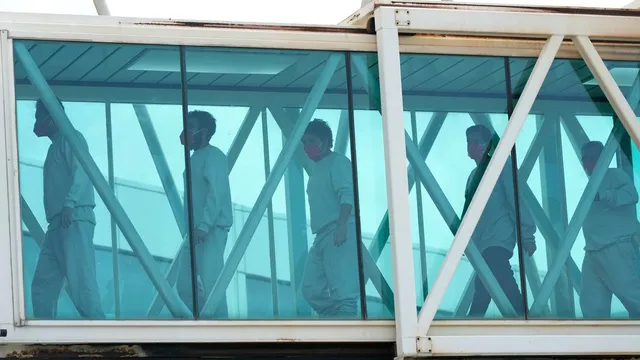
Supreme Court facilitates deportation for over 500,000 immigrants
2025-05-30 21:19- The Supreme Court's ruling allows the Trump administration to revoke the humanitarian parole program for migrants from Cuba, Haiti, Nicaragua, and Venezuela.
- This decision leads to significant potential deportations and impacts the lives of over 500,000 immigrants previously granted temporary legal status.
- Critics argue that the ruling exacerbates existing immigration issues and puts vulnerable families at risk of harm.
Express your sentiment!
Insights
On a recent Friday, the Supreme Court of the United States intervened to permit the Trump administration to suspend a humanitarian parole program that had allowed approximately 532,000 immigrants from Cuba, Haiti, Nicaragua, and Venezuela to live and work legally in the U.S. The program, put in place by the Biden administration, provided temporary legal status primarily due to humanitarian concerns surrounding conditions in their home countries. The ruling signifies the administration’s renewed push to tighten immigration policies during Trump’s second term, amid ongoing legal challenges in lower courts. The high court's decision to stay a district court’s ruling that had blocked the termination of the Temporary Protected Status (TPS) program enables the government to proceed with deporting numerous individuals who had previously benefited from this program. Critics have condemned the ruling for its anticipated negative impact on the lives of these immigrants and their families, labeling it a mass illegalization event that would upend the livelihoods of hundreds of thousands of noncitizens. Legal experts indicated that this decision could significantly heighten tensions and complexities surrounding immigration laws in the U.S. as the nation grapples with long-standing issues regarding border security and immigrant rights. In an unusual move, the Supreme Court’s order did not come with a detailed explanation, typical of its emergency orders, yet dissenting justices Ketanji Brown Jackson and Sonia Sotomayor expressed grave concerns regarding the implications of this ruling. They argued that the majority of the court had failed to properly assess the potential consequences for individuals facing deportation, particularly as legal claims surrounding their status were still underway. This dissent highlighted concerns about the lack of attention given to the lives affected by these sweeping policy changes, which could force many individuals to return to countries they fled due to perilous situations. The legal debate surrounding immigration policy continues to be a hot topic in American political discourse, as various non-governmental organizations and advocates argue that the ruling undermines the humane treatment of immigrants fleeing crisis situations. The reliance on discretionary powers by the Department of Homeland Security to revoke status en masse raises critical questions regarding executive authority in immigration matters. As the case unfolds in lower courts, the ramifications of the Supreme Court's ruling are certain to resonate well beyond legal circles, affecting families, communities, and the broader framework of U.S. immigration law.
Contexts
The impact of Supreme Court decisions on immigration policy is profound and far-reaching, shaping the legal landscape through which immigration laws are interpreted and enforced. Over the years, the Supreme Court has made critical rulings that have influenced immigration regulations, refugee protections, and the rights of immigrants within the United States. These decisions reflect the complex interplay between legislative intent and judicial interpretation, impacting families, communities, and national policy. As immigration remains a central issue in American society, the role of the Supreme Court in adjudicating related cases is critical to understanding how laws are applied and how they evolve over time, particularly in response to shifting political contexts and public sentiments. One significant case in recent history is "Department of Homeland Security v. Regents of the University of California," where the Supreme Court ruled against the termination of the Deferred Action for Childhood Arrivals (DACA) program. This decision underscored the necessity for federal agencies to follow proper legal protocols before making sweeping changes to immigration programs. The ruling not only provided relief to hundreds of thousands of DACA recipients but also emphasized the importance of maintaining consistency and stability in immigration policy. It illustrated how Supreme Court rulings can provide a check on executive power, ensuring that immigration policies are not only enforceable but also adhere to the principles of due process and fair treatment. Another pivotal case is "United States v. Texas," which involved the challenge to the Deferred Action for Parents of Americans (DAPA) program. The Supreme Court's deadlock in this case reflected the contentious nature of immigration policy and the divisions within the court on such issues. The tie vote effectively upheld the lower court's decision to block DAPA, showcasing the judiciary's role in shaping immigration policy by halting programs that were deemed beyond the scope of executive authority. This outcome has significant implications for current and future administrations, as it highlights the limitations that courts can impose on executive actions in the realm of immigration. Overall, Supreme Court decisions serve as crucial junctures that define and redefine immigration policy. They can affirm or nullify executive actions, influence legislative developments, and dictate how laws are interpreted on the ground. As new cases continue to emerge, the judicial branch will likely remain a pivotal player in shaping immigration law and policy, thus reflecting broader societal values and the ongoing debates surrounding immigration in America. The dynamic nature of these rulings illustrates not only the power of the judiciary but also the importance of an engaged public and responsive legal frameworks that adapt to the needs and changes within society.